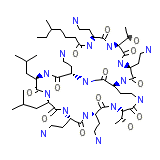p-Chlorophenyl glyceryl ether




p-Chlorophenyl glyceryl ether Brand names, p-Chlorophenyl glyceryl ether Analogs
p-Chlorophenyl glyceryl ether Brand Names Mixture
- No information avaliable
p-Chlorophenyl glyceryl ether Chemical_Formula
C52H98N16O13
p-Chlorophenyl glyceryl ether RX_link
No information avaliable
p-Chlorophenyl glyceryl ether fda sheet
p-Chlorophenyl glyceryl ether msds (material safety sheet)
p-Chlorophenyl glyceryl ether Synthesis Reference
No information avaliable
p-Chlorophenyl glyceryl ether Molecular Weight
2797.3193 g/mol
p-Chlorophenyl glyceryl ether Melting Point
200 - 220 oC
p-Chlorophenyl glyceryl ether H2O Solubility
5.64E+005 mg/L
p-Chlorophenyl glyceryl ether State
Solid
p-Chlorophenyl glyceryl ether LogP
-4.648
p-Chlorophenyl glyceryl ether Dosage Forms
Capsule; Cream; Liquid; Ointment; Powder for solution; Solution; Suspension; Tablet; Tablet (enteric-coated); Tablet (extended-release)
p-Chlorophenyl glyceryl ether Indication
For the treatment of acute or chronic infections due to sensitive strains of certain gram-negative bacilli, particularly Pseudomonas aeruginosa.
p-Chlorophenyl glyceryl ether Pharmacology
Colistin is a polymyxin antibiotic agent. Polymyxins are cationic polypeptides that disrupt the bacterial cell membrane through a detergentlike mechanism. With the development of less toxic agents, such as extended-spectrum penicillins and cephalosporins, parenteral polymyxin use was largely abandoned, except for the treatment of multidrug-resistant pulmonary infections in patients with cystic fibrosis. More recently, however, the emergence of multidrug-resistant gram-negative bacteria, such as Pseudomonas aeruginosa and Acinetobacter baumannii, and the lack of new antimicrobial agents have led to the revived use of the polymyxins.
p-Chlorophenyl glyceryl ether Absorption
Very poor absorption from gastrointestinal tract.
p-Chlorophenyl glyceryl ether side effects and Toxicity
Oral LD50 in rats is 5450 mg/kg. Overdosage with colistimethate can cause neuromuscular blockade characterized by paresthesia, lethargy, confusion, dizziness, ataxia, nystagmus, disorders of speech and apnea. Respiratory muscle paralysis may lead to apnea, respiratory arrest and death.
p-Chlorophenyl glyceryl ether Patient Information
No information avaliable
p-Chlorophenyl glyceryl ether Organisms Affected
Gram-negative bacilli














